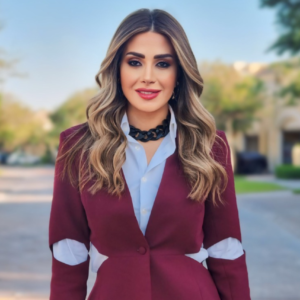Description

VOE is proud to announce a valuable collaboration with Ms. Ghazal Al-Baghdadi, Parenting Consultant, to deliver the workshop:
Main Theme
How to verbally communicate with my children
Presented By
Ms. Ghazal Al-Baghdadi, Parenting Consultant and Founder of Kenz Mother, educational consultant, CEO of Kenz and Mom Academy. She has been working in the children’s world for more than ten years. Ms. Baghdadi founded Kenz and Mom Academy with the aim of upbringing children in a safe environment filled with love and respect in the Arab world. Ms, Ghazal always seeks to provide realistic educational content full of compassion and respect for children. Through it, she was able to change many erroneous educational concepts, which reached millions of mothers and nannies around the world.
Location
Doha, Qatar
Date and Time
( 12pm – 7pm ) 18 May, 2024
Language of Delivery
Arabic Language
Method of Participating
Online and Onsite
Fees
Online: $145 USD
On-site: $200 USD
Golden Package: $359 USD
Who is this workshop for?
Caregivers: Everyone who deals with children under the age of 18, mother, father, teacher, teacher…Professionals: those who deal with children (doctors, nurses, providers of child-specific courses such as drawing, dancing or sports…)
Workshop Topics
- The Definition of Effective Verbal Communication with Children
- The Importance of Dialogue in the Educational and the Upbringing Journey
- Why Should I Have a Conversation with My Child?
- Answering the Common Concern (Does My Child Understand Me?)
- Incorrect Dialogue.
- Answering The Question (Why Can’t My Child Hear Me?)
- Basic Rules for Dialogue with the Child
- Exercises, Applications, and Practical Cases
- Questions And Answers
As a parent or caregiver, you may already have numerous conversations with your kids every day, but have you ever stopped to consider just how impactful these interactions can be?
Engaging in open dialogue with your children allows them to express their thoughts and emotions freely. It creates an environment where they feel valued and heard, fostering a strong bond between parent and child. By actively listening to their words and encouraging them to share their ideas, you are validating their feelings and boosting their self-esteem.
Effective verbal communication also plays a crucial role in your child’s cognitive development. Through conversation, they learn new vocabulary, sentence structures, and even critical thinking skills. Engaging in meaningful discussions helps expand their knowledge base while honing essential language skills that will benefit them throughout life.
Furthermore, fostering open lines of communication provides an opportunity for parents to guide their children through challenging situations. By talking openly about topics such as values, emotions, relationships, or even problem-solving strategies; parents can equip children with valuable life skills.
Course Outline
The Golden Package (VIP)
• Seating in the front rows
• Access to both the first and second days
• 15% discount on any course offered by the institute
• Access to recorded material for 6 months






